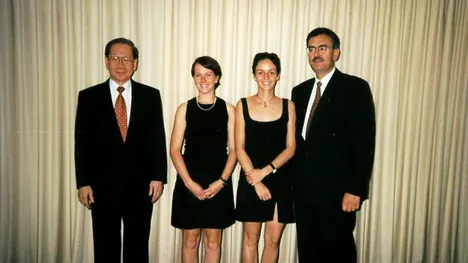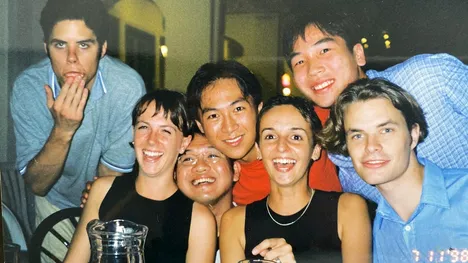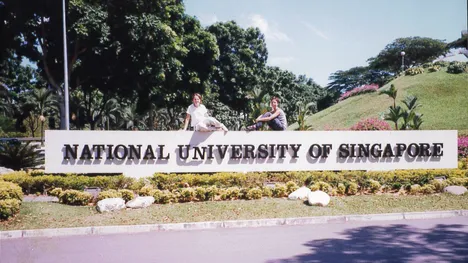In an increasingly interconnected world, developing international skills is more critical than ever. For almost 30 years, the TUMexchange program has offered TUM students the opportunity to gain valuable professional and cultural insights at renowned partner universities outside Europe. Two TUMexchange pioneers who now work at TUM share their experiences from 1998 at the National University of Singapore (NUS). Applications for the next round are open from October 22.
International cooperation is essential in the current geopolitical situation, which brings many challenges. In student exchange, TUM has been achieving record numbers in the Erasmus program for years, and exchanges with partner universities outside the EU are also becoming increasingly popular. The latest round of applications for the TUMexchange program confirms this trend: interest in international learning experiences continues unabated, with application numbers reaching new highs. Countries such as Canada, Australia, the USA, Japan, and South Korea were particularly popular.
Over 100 TUMexchange partner universities worldwide

As one of TUM's central exchange programs, TUMexchange enables students from all disciplines to study at selected partner universities in 31 countries worldwide. This experience is not limited to academic benefits but also promotes intercultural understanding and global competencies – skills that are essential in today's working world. Over the years, the program has developed into a structured and continuously evolving platform that helps students make the most of their time abroad.
Florian Ott studies Mechanical Engineering at TUM and actively supports TU eMpower Africa. He spent a semester at KNUST in Ghana through TUMexchange. The best decision, he says:
“The challenge of finding my way in a completely new cultural environment has strengthened my self-confidence and broadened my openness to other ways of life. The intercultural cooperation and living together on this special campus have enhanced my communication and teamwork skills and the exchange with local professors and students has opened up new perspectives on technical challenges and solutions. I am very grateful to the TUM Global Office team for their support during the application phase.”
One example of long-standing and successful international cooperation is Singapore, one of the program's top destinations. TUM has had its campus in Singapore since 2002 and has maintained close partnerships with the top local universities ever since.
Semester abroad at the NUS: Pioneers of the first TUMexchange generation share their experiences

Sabine Viererbl and Yolande Schneider are TUM employees and also pioneers of the first TUMexchange generation. From July to November 1998, they were exchange students at the National University of Singapore (NUS). In the interview, they talk about their experiences and point out the lasting impact their experience abroad had on their professional careers.
Why was it important for you to go abroad during your studies?
Sabine: I went to the European School in Munich, lived with my family in the USA for two years, and traveled as often as possible as a teenager. I really wanted to go abroad for a semester during my geography studies at TUM to see what it's like to study and live in another country.
Yolande: I'm originally from South Africa and then emigrated to Germany with my family when I was 10. So, I was kind of naturally open to other experiences abroad.
How did you end up going to Singapore?
Yolande: In my case, it was more of a coincidence. I was studying geography at TUM with Sabine at the time. She told me that there was an opportunity to go to Singapore. I have to admit that I didn't really know anything about Singapore or the NUS, but it certainly sounded like an adventure.
I worked as a student assistant in the International Office during my studies. A new exchange agreement was to be signed with the National University of Singapore, the first in the Southeast Asia region, and the team knew that I wanted to go abroad. I was asked if I would be interested in participating as a pioneer. Of course, I could not refuse such an offer.
How was it, and what impressions did you gain?
Yolande: It was great – everything was very different from Munich. We lived in a student hall of residence and made contact with lots of other students straight away. In geography, we were actually the only two exchange students at NUS. This meant that we got to know a lot of Singaporeans and not just other exchange students. We also had a few "culture shock moments," which we then thought about and could laugh about afterwards.
Sabine: I remember sitting in the first lectures and being quite cold. The air conditioning was set very high, and we were dressed completely wrong. We also hardly understood a word that the professors or fellow students were saying. The Singlish, Singapore-English, as the Singaporeans call it, is English with a strong tendency towards Chinese, and you have to get used to it first. But after a short time, we were able to understand most of it well.

What influence did your stay abroad have on your life?
Sabine: After my studies at TUM, I worked for the GIZ in development cooperation for two years. This job involved a lot of travel, mainly to Africa, and was unfortunately no longer compatible with my family plans. I then became aware of a position in the International Office at TUM, and since then, I have enjoyed working in this very international environment on various topics. The most important thing for me in my work is that we try to enable as many students as possible to spend time abroad. I would say that I have become much more independent, open, tolerant, and curious since my stay abroad.
Yolande: After my stay abroad, I was really hooked and wanted to see and learn more about the world. After my diploma, I did a Master's degree in Edinburgh, then went to London and worked for a small NGO in development cooperation with a focus on Africa. That's how I ended up back at TUM - as an international representative for the then Department of Architecture. Sabine drew my attention to the job advertisement. So, that's how things came full circle.
Interested in going abroad yourself? Now is your chance to gain international experience and get to know TUM's partner universities first-hand:
